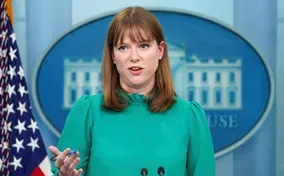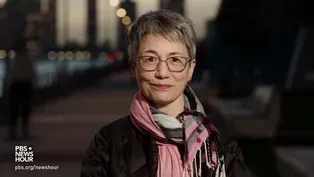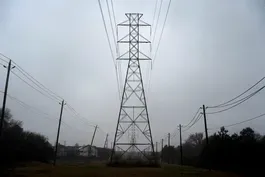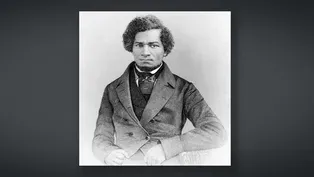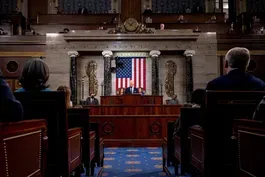
S.D. Sen. Thune on what he wants from State of the Union
Clip: 2/7/2023 | 8m 1sVideo has Closed Captions
South Dakota Sen. John Thune on what he wants to hear from State of the Union
Sen. John Thune of South Dakota is the second-highest-ranking Republican in the Senate. He joined Amna Nawaz to discuss what he'd like to hear from President Biden's State of the Union address.
Problems with Closed Captions? Closed Captioning Feedback
Problems with Closed Captions? Closed Captioning Feedback
Major corporate funding for the PBS News Hour is provided by BDO, BNSF, Consumer Cellular, American Cruise Lines, and Raymond James. Funding for the PBS NewsHour Weekend is provided by...

S.D. Sen. Thune on what he wants from State of the Union
Clip: 2/7/2023 | 8m 1sVideo has Closed Captions
Sen. John Thune of South Dakota is the second-highest-ranking Republican in the Senate. He joined Amna Nawaz to discuss what he'd like to hear from President Biden's State of the Union address.
Problems with Closed Captions? Closed Captioning Feedback
How to Watch PBS News Hour
PBS News Hour is available to stream on pbs.org and the free PBS App, available on iPhone, Apple TV, Android TV, Android smartphones, Amazon Fire TV, Amazon Fire Tablet, Roku, Samsung Smart TV, and Vizio.
Providing Support for PBS.org
Learn Moreabout PBS online sponsorshipAMNA NAWAZ: For a top Republican take ahead of President Biden's State of the Union speech tonight, I'm joined by Senator Thune of South Dakota.
He's the second highest ranking Republican in the Senate.
Senator Thune, welcome back to the "NewsHour."
Thank you for joining us.
Let's start with the State of the Union.
What is it that you hope to hear from President Biden tonight?
SEN. JOHN THUNE (R-SD): Well, Amna, I think what most Republicans want to hear is the president actually sort of lay out a plan of how he would like to work with Republicans.
I mean, he ran as a moderate.
He ran as somebody who wanted to unify the country.
And then the last -- but the last two years have been a lot of very partisan legislating.
And I think there are a lot of members on our side who are interested to hear what the president has to say about how he's going to tackle inflation, which is absolutely devastating the pocketbooks of a lot of Americans around this country.
Look at inflation in everything, but certainly food, over 18 percent increase since he took office.
So I think talking about that, I think talking about what we're going to do to become energy-independent again, and that's something I think Republicans would be very interested in working with him on.
I think there's a lot of interest, obviously, in our farmers and ranchers.
This is a farm bill year.
And it's an issue that historically has been bipartisan.
There are things that we can do there to support those who feed not only our country, but the world.
And I think there's some things we can do to hold big tech accountable.
I think that seems to be a bipartisan agenda item.
And I think those are all things that we need to work on together, first and foremost, of course, national security.
And so I hope he does address what happened over the weekend, because the first job of a president obviously is to keep people in this country safe and secure and deal with keeping America -- keeping America safe.
So I would look forward to hearing about that.
And, I mean, I think there's some other things on the horizon economically, some trade things that we could be doing that this administration has not been doing.
So there's a whole range of things I think that we look forward to hearing from to talk about.
But, clearly, he's going to talk about what he wants to talk about.
AMNA NAWAZ: Well, I think a lot of people are waiting to hear on the economy.
As you know, that is top on Americans' minds.
And when you look at where things are now, unemployment is at a 50-year low.
Inflation does seem to be cooling, right?
The new jobs numbers last week topped 500,000, far exceeding expectations.
The White House is arguing things are getting better and will continue to get better.
Do you disagree?
SEN. JOHN THUNE: Well, I think that will be his argument.
But it doesn't -- I don't think people are feeling that.
If you look at any of the evidence that's out there, either anecdotal or the polling that's been done, people just don't feel like their lives are improving.
And I think a lot of that comes back to inflation.
And as long as inflation is at the rate that it is, you could have some modest growth in the economy, and you could have unemployment at a fairly low level, but people are losing ground every year.
And that's why I talked about food, cost of food being up 18.6 percent since this president took office.
And that runs really across the board.
Energy is a lot higher too.
And so people in their daily lives and their pocketbooks just aren't feeling the impact of what the president says are his successes.
So, I think there's a disconnect there.
And my assumption is, he will attempt to address that tonight.
But I think there are just a lot of people and a lot of Republicans who perhaps aren't convinced that the president's policies are having the desired effect.
And I would, certainly, after the last two years, again, which I think was a lot of partisan legislating and a lot of spending, there's going to be a strong argument to be made that it's time to wind down the spending and to do things in the area of taxes and regulation that will provide incentives for businesses to invest and to create jobs and to create those better-paying jobs out there.
AMNA NAWAZ: On the issue of bipartisanship, I should point out, over the last year, the president did meet with Republican leaders several times at the White House, right, on pandemic relief and on infrastructure.
He actually appeared alongside Senate Minority Leader Mitch McConnell at a major bridge repair project in Kentucky.
Do you want to see more bipartisanship than that?
That seems like a pretty strong message over the last year.
SEN. JOHN THUNE: I think that - - those are all examples.
And I think there's a lot of room to build on that.
But, I mean, I think you would start right now by continuing to have these conversations with the speaker of the House, Kevin McCarthy, dealing with the debt limit and potentially budget spending reforms.
We have got a $31 trillion debt.
We can't continue to spend like this forever.
A lot of these programs are going to go bankrupt in the very near future if we don't take steps to save and sustain them and make them viable, not only for current retirees, but for future generations of retirees.
So I think there are some great examples right now directly in front of us, Amna, where this president, if he wanted to, could step forward and demonstrate a willingness to do some things that I think you could say are bipartisan, and maybe look for some areas of accomplishment.
I think it's going to be hard in these next couple of years, because you have got a divided government.
And a divided government can provide obviously a lot of conflict.
And I expect we will see plenty of that.
But it also can create the conditions that are favorable for getting consequential things done.
And history has proven that.
And I hope that that's the case in the next couple of years, but it takes presidential leadership in order to do that.
And he's going to have to reach out.
And I think you will find Republicans like Speaker McCarthy who are willing to meet him.
AMNA NAWAZ: We know that Arkansas Governor Sarah Huckabee Sanders is going to be delivering the Republican response tonight.
You mentioned wanting to hear from the president the desire for bipartisanship, areas where both parties can work together.
Do you hope to hear the same message from her?
SEN. JOHN THUNE: I do.
I mean, I think you're going to hear -- she's a very principled young leader.
It's interesting.
You got a great contrast.
You got the youngest governor in the country responding to the oldest president in American history.
I think the contrast there won't be lost on anyone.
But I think what she's going to be talking about is a conservative agenda, but an agenda that is really grounded in principles that I think most hopefully not just conservatives in this country, but a majority of Americans hold dear.
And that is a belief and limited, but effective government, and personal freedom, coupled with individual responsibility, that you have got to keep the country strong to keep it safe, a belief in economic freedom, and creating incentives for businesses to invest in and create those better-paying jobs.
So I think those are the kinds of themes that she will touch on.
And I think those are themes that will resonate well with the American people.
AMNA NAWAZ: Senator, I have got about a minute left, but you mentioned areas of cooperation ahead.
When you look at where Americans' priorities are right now, obviously, the economy is top of everything.
But, after that, there's concerns like reducing crime, climate change, gun violence, immigration.
Are any of those, any of those at all areas you think that the two sides could come together and work together?
SEN. JOHN THUNE: Those are hot issues.
And immigration is a -- the border is a -- I think you would have to argue, by any objective metric, over the past two years in this administration deteriorated rapidly and a disaster on a humanitarian level and on a national security level.
There are just lots of threats that exist there.
And... AMNA NAWAZ: But can the two parties come together on immigration?
SEN. JOHN THUNE: Well, and that's -- I think they -- I think that's possible, if the administration would be willing, again, to reach out and say, OK, what are the things that you need in a border bill?
And securing the border is going to be first and foremost a priority for Republicans on Capitol Hill.
But I think there's a potential for a deal there.
And it is an issue that's crying out for a solution.
Now, many of the things that -- there are a lot of things the president can do on his own.
He doesn't need Congress.
A lot of the policies that he reversed when he took power on the border, I think, have proven to be a huge failure.
But I do think that, if he wants to turn it around, and he's looking for help from members of Congress, there is a path forward that would allow that to happen.
But it's going to require, as I said earlier -- any big issue, any consequential issue requires a high level of presidential leadership, and he's going to have to be willing to come and I think meet Republicans in Congress partway.
AMNA NAWAZ: Senate Minority Whip Senator Thune joining us tonight.
Senator Thune, thank you.
Good to see you.
SEN. JOHN THUNE: Thanks, Amna.
Good to be with you.
Biden to outline accomplishments and tout optimism for U.S.
Video has Closed Captions
Clip: 2/7/2023 | 6m 4s | Biden to outline accomplishments and tout optimism for U.S., White House spokesperson says (6m 4s)
A Brief But Spectacular take on the power of poetry
Video has Closed Captions
Clip: 2/7/2023 | 2m 30s | A Brief But Spectacular take on the power of poetry (2m 30s)
Earthquake death toll rises by thousands in Turkey, Syria
Video has Closed Captions
Clip: 2/7/2023 | 12m 25s | Desperate rescues continue in Turkey and Syria as earthquake death toll rises by thousands (12m 25s)
FBI foils plot to bring down Baltimore’s electrical grid
Video has Closed Captions
Clip: 2/7/2023 | 6m 34s | FBI foils extremist plot to bring down Baltimore’s electrical grid (6m 34s)
New England and Frederick Douglass' first steps to freedom
Video has Closed Captions
Clip: 2/7/2023 | 6m 51s | New England's role in Frederick Douglass' first steps to freedom (6m 51s)
What to expect from Biden's State of the Union address
Video has Closed Captions
Clip: 2/7/2023 | 5m 24s | What to expect from Biden's State of the Union address (5m 24s)
Providing Support for PBS.org
Learn Moreabout PBS online sponsorshipSupport for PBS provided by:
Major corporate funding for the PBS News Hour is provided by BDO, BNSF, Consumer Cellular, American Cruise Lines, and Raymond James. Funding for the PBS NewsHour Weekend is provided by...
